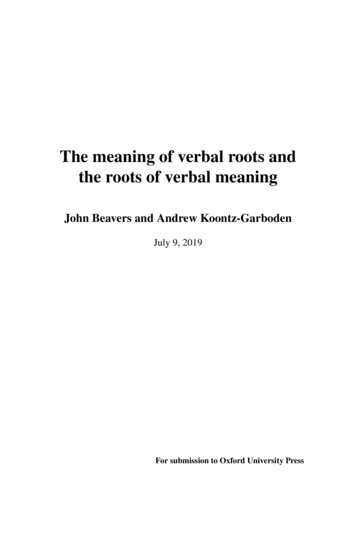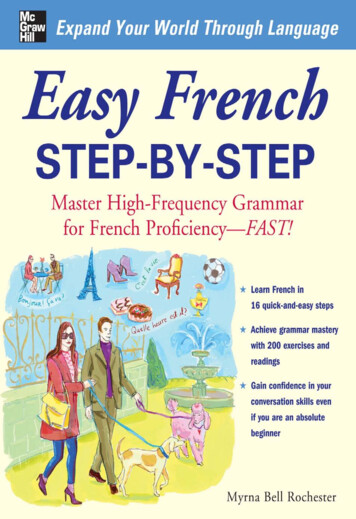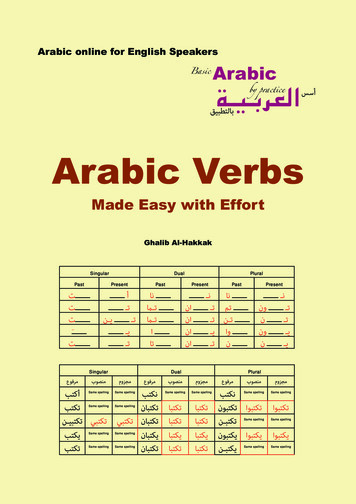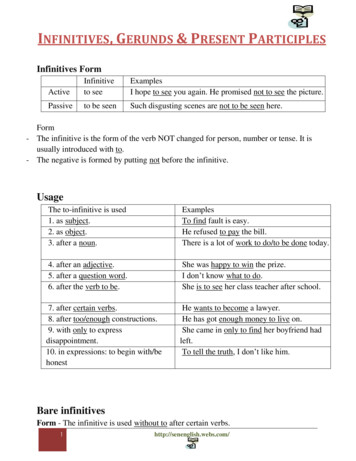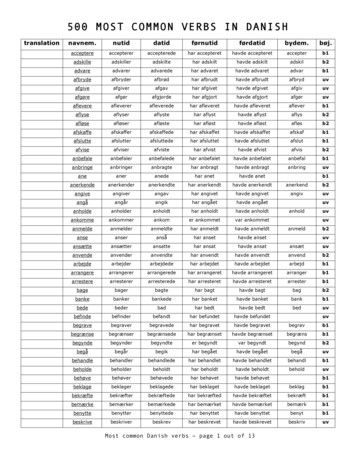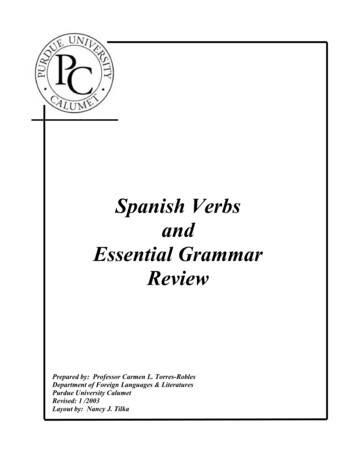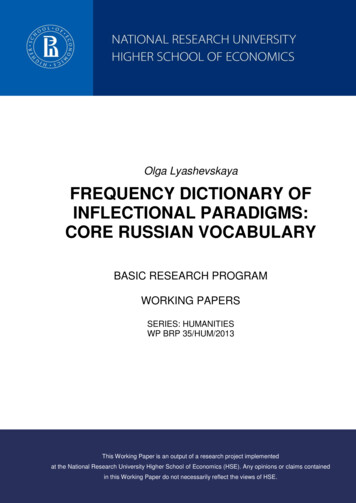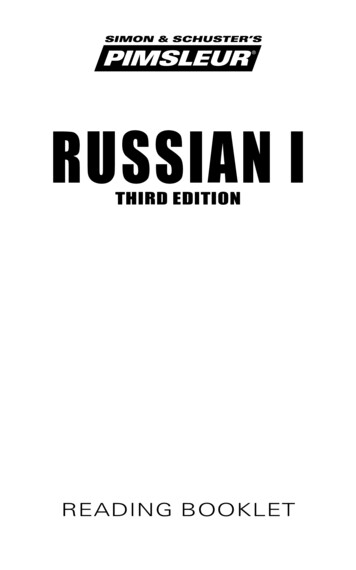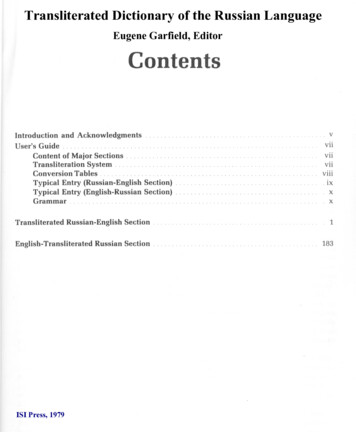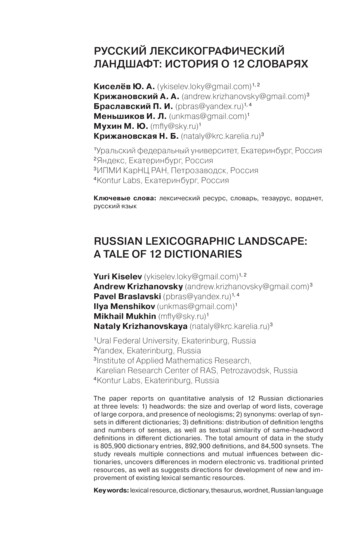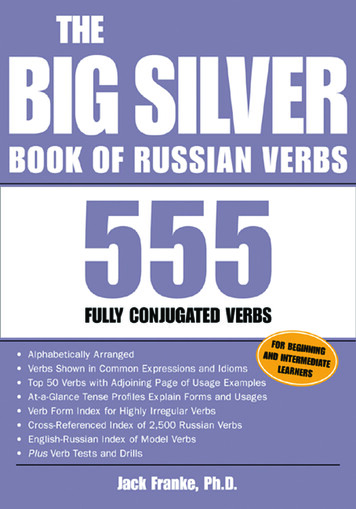
Transcription
THEBIGSILVERBOOK OF RUSSIAN VERBS555FULLY CONJUGATED VERBSJack E. Franke, Ph.D.
Copyright 2005 by Jack Franke. All rights reserved. Manufactured in the United States ofAmerica. Except as permitted under the United States Copyright Act of 1976, no part of thispublication may be reproduced or distributed in any form or by any means, or stored in a databaseor retrieval system, without the prior written permission of the publisher.0-07-146003-9The material in this eBook also appears in the print version of this title: 0-07-143299-X.All trademarks are trademarks of their respective owners. Rather than put a trademark symbolafter every occurrence of a trademarked name, we use names in an editorial fashion only, and tothe benefit of the trademark owner, with no intention of infringement of the trademark. Wheresuch designations appear in this book, they have been printed with initial caps. McGraw-HilleBooks are available at special quantity discounts to use as premiums and sales promotions, or foruse in corporate training programs. For more information, please contact George Hoare, SpecialSales, at george hoare@mcgraw-hill.com or (212) 904-4069.TERMS OF USEThis is a copyrighted work and The McGraw-Hill Companies, Inc. (“McGraw-Hill”) and itslicensors reserve all rights in and to the work. Use of this work is subject to these terms. Exceptas permitted under the Copyright Act of 1976 and the right to store and retrieve one copy of thework, you may not decompile, disassemble, reverse engineer, reproduce, modify, createderivative works based upon, transmit, distribute, disseminate, sell, publish or sublicense thework or any part of it without McGraw-Hill’s prior consent. You may use the work for your ownnoncommercial and personal use; any other use of the work is strictly prohibited. Your right touse the work may be terminated if you fail to comply with these terms.THE WORK IS PROVIDED “AS IS.” McGRAW-HILL AND ITS LICENSORS MAKE NOGUARANTEES OR WARRANTIES AS TO THE ACCURACY, ADEQUACY ORCOMPLETENESS OF OR RESULTS TO BE OBTAINED FROM USING THE WORK,INCLUDING ANY INFORMATION THAT CAN BE ACCESSED THROUGH THE WORKVIA HYPERLINK OR OTHERWISE, AND EXPRESSLY DISCLAIM ANY WARRANTY,EXPRESS OR IMPLIED, INCLUDING BUT NOT LIMITED TO IMPLIED WARRANTIESOF MERCHANTABILITY OR FITNESS FOR A PARTICULAR PURPOSE. McGraw-Hill andits licensors do not warrant or guarantee that the functions contained in the work will meet yourrequirements or that its operation will be uninterrupted or error free. Neither McGraw-Hill nor itslicensors shall be liable to you or anyone else for any inaccuracy, error or omission, regardless ofcause, in the work or for any damages resulting there from. McGraw-Hill has no responsibilityfor the content of any information accessed through the work. Under no circumstances shallMcGraw-Hill and/or its licensors be liable for any indirect, incidental, special, punitive,consequential or similar damages that result from the use of or inability to use the work, even ifany of them has been advised of the possibility of such damages. This limitation of liability shallapply to any claim or cause whatsoever whether such claim or cause arises in contract, tort orotherwise.DOI: 10.1036/0071460039
Want to learn more?We hope you enjoy thisMcGraw-Hill eBook! Ifyou’d like more information about this book,its author, or related books and websites,please click here.
For more information about this title, click hereContentsRussian Tense Profiles 1 Easy-to-view summaries of formation and uses of each tenseThe Basics of Conjugation 2The Persons of the Verb 2The Stem 3Verbal Aspect 4Tense 5Conjugation 6Mood 6The Present Tense 7The Past Tense 15The Future Tense 17The Subjunctive Mood 19Participles 20Verbal Adverbs 25Commands (The Imperative) 26Reflexive Verbs 27Verbs of Motion 28The Multidirectional Verb of Motion 28The Unidirectional Verb of Motion 29The Prefixed Verb of Motion 30The Verb of Motion by Vehicle 31Russian Motion Verb Index 32555 Fully Conjugated Verbs 33 Alphabetically ordered with examples of common useTop 50 Verbs: Full page of examples adjoining select conjugationsVerb Exercises 642 Drills to test and improve your grasp of correct verb formsAnswers to Exercises 647English-Russian Verb Index 648 555 verb models cross-referenced by their English meaningIrregular Verb Index 654 Index showing the infinitive of irregular Russian verb formsRussian Verb Index 657 More than 2,000 verbs cross-referenced to the full verb modelsiii
PrefaceThe Big Silver Book of Russian Verbs is intended for use with all major Russian language textbooks in any course from the first through the fourth years, or separately as a reference for independent study. This book is comprised of verbs from the most popular textbooks in use today, aswell as reflecting frequency usage in contemporary Russian. The aim of this book is to providestudents with a single reference that they can turn to for questions on conjugation, stems, collocations, and usage.I am grateful to the following professors for their efforts in promoting Russian, and those whoprovided me the foundation and inspiration to write this book: Ronni Gordon, David Stillman,Jean Rose, Norma Barr, William Lewis, Gerald Earvin, Sophia Lubensky, Benjamin Rifkin,Thomas Garza, Charles McDowell, Nina Aleksandrovna Lubimova, and Anto Knezevic. I wouldlike to express my appreciation to two colleagues who typed large portions of this manuscript:Stephanie Rodriguez and John S. Holsonbach.Numerous references were consulted in the preparation of this book. These include:The Russian Verb: Prepositional and Non-Prepositional Government (Andreyeva Georg and Tolmachova, Moscow: Russky yazyk Publishers, 1983) was used for verbal government.Fundamentals of Russian Verbal Government for Students and Teachers (Thomas J. Garza, Dubuque,Iowa: Kendall/Hunt Publishing, 1994) was incorporated for the Jackobsonian one-stem verbalstem system.Complete Handbook of Russian Verbs (L.I. Pirogova, Lincolnwood, Illinois: Passport Books, 1995)served as a basis to simplify Russian verbal conjugations into six classes and irregular verbs.Bol’shoi Tolkovyj Slovar’ Russkogo Yazyka (S.A. Kuznetsov, St. Petersburg: Norint, 1998) providednumerous contemporary examples and usage in the modern, post-soviet Russian language.Russian-English Dictionary of Idioms (Sophia Lubensky, New York: Random House, 1995) wasused to verify the collocations and phraseology of many of the idioms.I would also like to thank my agent, Danielle Jatlow, at Waterside Productions.Посвящается моей жене Людмиле.Copyright 2005 by Jack Franke. Click here for terms of use.
RUSSIANTENSEPROFILESCopyright 2005 by Jack Franke. Click here for terms of use.
2THE BASICS OF CONJUGATIONTHE BASICS OF CONJUGATIONThe verb is the most important part of speech in the Russian language. Quite frankly,'to be' or 'not to be' is out of the question without a verb. The number of verbs in theRussian language is vast and amorphous, and it is important that English-speakingstudents learn the nuances and idiosyncrasies of the Russian verbal system. Thissystem is predicated on the existence of the following:1) The Persons of the Verb2) The infinitive3) The stem4) Verbal Aspect5) Tense6) Conjugation7) MoodThese concepts are summarized below. Acquaint yourself with them before proceedingto the profiles of each tense.The Persons of the Verb in EnglishFIRST PERSONSECOND PERSONTHIRD PERSONSINGULARPLURALIyouhe, she, itweyoutheyThe Persons of the Verb in RussianThe subject pronouns in Russian correspond similarly to the English system.FIRST PERSONSECOND PERSONTHIRD PERSONSINGULARPLURALяты, выон, она, ономывыониNote the following:1 · ты is the informal usage for you. It is used with family members, children, closefriends, and pets. When Russians wish to speak informally to one another for the fisttime, they say, “Дава йте бу дем на ты.”2 · The Russian has two forms for you. They vary according to formality and number.Ты is informal singular, вы is formal singular and informal plural. Вы is the markerof formality, politeness, and seniority. Whenever you are in doubt about which formto use, err on the side of caution and use the polite form (Вы) unless you are speaking to a child or a pet.The InfinitiveThe infinitive is the form of the verb that is typically show in dictionaries; it is not conjugated. You can recognize the infinitive by its ending: -ть, -ти, or -чь. In English a verbbeginning with “to” is an infinitive. The infinitive is made up of the stem and its ending.
THE STEM3The Russian Spelling RuleIn determining whether the first person singular ending is -ю or -у, or the third personplural ending is -ят or -ат, it is important to memorize the spelling rule that г, к, х, ж, ч,ш, ш, ц are followed by а, у, but never я, ю. The reason is that these consonants are considered hard, and therefore can not be followed by the soft vowels я, ю.The StemThe one-stem system of Russian verbal conjugation is used throughout this book. Thissystem was created by the world reknowned Russian-American scholar Roman Jakobson.By learning the stem of a given verb and a few conjugation paradigms, the learner shouldbe able to create the full paradigm of a given verb. In total there are eleven verb types, allof which are represented in the model conjugations. For the sake of brevity and clarity,however, only six verb types are classified in this book. They are:regular type 1 verb (like рабо тать, боле ть, ду ть, теря ть)regular type 2 verb (like говори ть, ви деть, стоя ть, молча ть)regular type 3 verb (like па хнуть, наде яться, ждать)regular type 4 verb (like тре бовать, воева ть)regular type 5 verb (like нести , красть, лезть)regular type 6 verb (like печь, стричь, жечь)INFINITIVEtype 1 (e.g. рабо тать)type 2 (e.g. говори ть)type 3 (e.g. па хнуть)type 4 (e.g. тре бовать)type 5 (e.g. нести )type 6 (e.g. печь)STEM рабо тай-, боле й-, ду й-, теря йговори -, ви де-, стоя -, молча па хну-, наде я ся, жда тре бова-, воева нёс-, крад-, лезпёк-, стриг -, ж г-All other verbs types are classified in this book as irregular verbs (i).The Two-Stem SystemIn Russian two methods of conjugating the verb are taught: the two-stem system andthe one-stem system. The two-stem system is taught in many high schools and collegesfor beginning students. In it, tense formation is based on an infinitive stem and a present-future stem, to which endings are added. The infinitive stem is derived from itsdictionary form. The present-future stem is derived by dropping the last two lettersfrom the third person plural of the verb. The following table shows the endings ofboth Conjugation I and II in the two-stem system.ятыон, онамывыониде латьговори ор-итеговор-ят
4VERBAL ASPECTThe One-Stem SystemThe one-stem system of verb formation in Russian is fairly simple, though it requires aknowledge of the third person plural of the present tense. Using the example verbрабо тать, to find the stem we conjugate the verb in the third person plural, thus creating рабо тают. Following Russian spelling rules, this gives us the stem рабо тай ут.The й is not seen in the conjugation, but whenever the letters я, е, ё, or ю are presentin a conjugation, this “semi-vowel” exists between the two vowels. The й is considereda consonant in the conjugation, and the following two formulae are used when combining the stem with its grammatical endings.Verb stems ending in a vowel are denoted as (V).Verb stems ending in a cononant are denoted as (C).Formula #1V C VCExampleговори - л говори лC V CVExampleрабо тай - у рабо таюV1 V2 V2Exampleжда- у жду C1 C2 C2Exampleрабо тай - л рабо талFormula #2Verbal AspectVirtually every verb in Russian is either imperfective or perfective in aspect. Aspectdescribes how the action takes place, and these aspects describe two different kinds ofaction. For example, the imperfective aspect describes actions of a general nature,things in progress, and repetitive or habitual actions. Perfective verbs, conversely,emphasize completion of an action (past or future) or have a restricted, focusedmeaning.Here are examples with the aspectual pairs учить/выучить and жить/прожитьИ горь учи л но вые слова весь ве чер. (Igor studied the new words all evening.)Наконе ц, И горь вы учил но вые слова. (Finally, Igor learned the new words.)Я жил всю жи знь в Москве .(I lived all my life in Moscow.)Моя соба ка прожила де сять лет. (My dog lived to be ten years old.)Although this explanation of aspect is rather simplified, it provides the basis forRussian language acquisition. However, there are numerous instances where the rulesappear to be violated, and even native Russian speakers may argue on the correctnessof a given sentence in certain situations.
VERBAL ASPECT5Imperfective AspectThe imperfective may be used in all three tenses in Russian: present, past and future.The actions must be seen as a process – incomplete, habitual, repetitive, or in general.Imperfective verbs also refer to actions that take place simultaneously or where there isan interruption. When in doubt, or if the result is unclear, the imperfective should beused as the default mode.In addition to the above-mentioned rules, there are certain adverbs and adverbialexpressions that suggest repetition or duration and encourage the use of the imperfective aspect.всегда - alwaysвре мя от вре мени - from time to timeка ждый день - every dayещё раз - againиногда - sometimesобы чно - usuallyча сто - oftenре дко - rarelyникогда - neverPerfective AspectThe perfective aspect, by its nature, has only two tenses in Russian: past and future.Since the present tense is “in progress,” it cannot be completed. Perfective verbs areoften used where there was or will be a completed action. In addition, in questionswhere the interlocutor specifically asks about an event using the perfective aspect, thesame aspect is used in the response.As with the imperfective aspect, there are also adverbs and adverbial expressions thatsuggest completion or finality and encourage the use of the perfective aspect.вдруг - suddenlyнаконе ц - finallyнеожи данно - unexpectedlyпока не - untilсовсе м - quite, completelyсра зу - immediatelyTenseTense describes when the action takes place. In Russian there are three tenses: present,past and future. The ending shows the person who performs the act and the tense.present tense:past tense:future tense:I work. I do work. I am working. I have been working. (Я рабо таю.)I worked. I did work. I was working. (Я рабо тал.)I will work. I will be working. (Я бу ду рабо тать.)Although Russian lacks the number of verb tenses found in English, through a combination of tense and aspect one can approximate all English tenses. The context of a givenRussian sentence will often provide clues to the equivalent English tense.
6CONJUGATIONConjugationIn the present tense, a Russian verb has 6 endings, corresponding to the person of theverb (see above). The singular subjects are: I (1st person), you (2nd person), or he/she/it(3rd person). The plural subjects are: we (1st person), you (2nd person), or they (3rdperson).In Russian there are two conjugation classes. The first conjugation is referred to as the-е- type (ё when stressed), and the second conjugation is referred to as the -и- type.Below are the endings of the two conjugation classes for the present tense. Class II isused for type 2 regular verbs. All other regular verbs follow Class I.Conjugation Class I (-е- type)FIRST PERSONSECOND PERSONTHIRD on Class II (-и- type)FIRST PERSONSECOND PERSONTHIRD �е-ят/(-ат)MoodRussian and English both have three moods: indicative, imperative, and subjunctive.The indicative mood is used to express factual statements; the imperative mood is used togive commands; and the subjunctive mood is used to express hypothetical or contrary-tofact statements.WarningDifferent textbooks, both in Russia and abroad, tend to use different rules and methodsfor teaching conjugation and the Russian verbal system. However, once the basic rules,as explained above, are memorized and patterns are established, the student will be ableto predict the conjugation for the majority of verbs.
CONJUGATION TYPES7The Present TenseExamine the conjugations of the six model verbs in the present tense, shown below. Youwill see that endings are not added, but are truncated, for example, й у ю. This is oneof the key features of the Russian one-stem verbal system.Present Tense Conjugation TypesOne example of each of the verb types is shown below; variants of each type appear onthe next six pages. Although all the verbs on this page have a set stress pattern, someverbs in the following pages exhibit a floating stress.Stem endingSingularStem endingрабо тать to workрабо тай у рабо тай ешь рабо тай ет Type 1рабо таюрабо таешьрабо таетрабо тай емрабо тай етерабо тай утговори ть to speakговори у говори ишь говори ит говорю говори шьговори тговори имговори итеговори ятпа хнупа хнешьпа хнетпа хну емпа хну етепа хну уттре буютре буешьтре буеттре бова емтре бова ететре бова ут тре буем тре буете тре буютType 5 несу несёшьнесётнёс емнёс етенёс утпе чь to bakeпёк упёк ешьпёк ет па хнем па хнете па хнутType 4нести to carryнёс унёс ёшьнёс ёт говори м говори те говоря тType 3тре бовать to demandтре бова у тре бова ешь тре бова ет рабо таем рабо таете рабо таютType 2па хнуть to smellпа хну упа хну ешьпа хну етPlural несём несёте несу тType 6 пеку печёшьпечётпёк емпёк етепёк ут печём печёте пеку т
8TYPE 1 CONJUGATIONType 1 Present Tense Conjugation SamplesType 1 verbs normally end in -ать, -еть, or -ять. These verbs typically have a stem thatends with a vowel. These verbs take Conjugation Class I endings.де лать to workде лай у де лай ешь де лай ет де лаюде лаешьде лаетде лай емде лай етеде лай утгре ть(ся) to warm; to warm upгре й у ся гре ю(сь)гре й ешь ся гре ешь(ся)гре й ет ся гре ет(ся) де лаем де лаете де лаютreflexiveгре й ем сягре й ете сягре й ут ся гре ем(ся) гре ете(сь) гре ют(ся)ду й емду й етеду й ут ду ем ду ете ду ютдуть to blowду й уду й ешьду й ет ду юду ешьду етката ть(ся) to ridereflexiveката й у ся ката ю(сь)ката й ешь ся ката ешь(ся)ката й ет ся ката ет(ся)ката й ем сяката й ете сяката й ут ся ката ем(ся) ката ете(сь) ката ют(ся)боле ть to be sick, become ill; to root forболе й уболе й ешьболе й ет боле ю боле ешь боле етболе й емболе й етеболе й ут боле ем боле ете боле ют теря й емтеря й ететеря й ут теря ем теря ете теря юттеря ть to loseтеря й утеря й ешьтеря й еттеря ютеря ешьтеря ет
TYPE 2 CONJUGATION9Type 2 Present Tense Conjugation SamplesType 2 verbs normally end in -ить. However, a small number of verbs may end in -ать,-еть, or -ять; Some examples include: гляде ть, зависе ть, звуча ть, лежа ть,молча ть, смотре ть, стоя ть, терпе ть, and шуме ть. Verbs in this conjugation takeClass II endings.жа рить to fry, grill, roastжа ри ю жа ри ишь жа ри ит жа рюжа ришьжа ритучи ть(ся) to teach; to study, learnучи у ся учи ишь ся учи ит ся жа рим жа рите жа рятжа ри имжа ри итежа ри ятreflexiveучу (сь)у чись(ся)у чит(ся)учи им сяучи ите сяучи ят сястою стои шьстои тстоя имстоя итестоя ят у чим(ся)у чите(сь)у чат(ся)стоя ть to standстоя ю стоя ишь стоя ит жени ться to get marriedжени ю сь женю сьжени ишь ся же нишьсяжени ит ся же нится стои м стои те стоя тreflexiveжени им сяжени ите сьжени ят ся же ним(ся) же ните(сь) же нят(ся)молча иммолча итемолча ят молчи м молчи те молча тсмотре имсмотре итесмотре ят смо трим смо трите смо трятмолча ть to be silent, keep silentмолча у молча ишь молча ит молчу молчи шьмолчи тсмотре ть to watch, look atсмотре ю смотрю смотре ишь смо тришьсмотре ит смо тритNote: Spelling Rules influence the 1st person singular and 3rd person plural ofучи ть(ся) and молча ть. Additionally, there is a floating stress in учи ть(ся), жени тьсяand смотре ть.
10TYPE 3 CONJUGATIONType 3 Present Tense ConjugationType 3 verbs normally end in -нуть, -еять, -аять, and a few verbs end in -ать or -ить.These verbs are conjugated in the present tense with Conjugation Class I, -е- type(ё when stressed).тону ть to sink, drownтони утони ешьтони ет тону то нешьто неттони емтони ететони утнаде яться to hope, wishнаде я ю сь наде я ешь ся наде я ет ся то нем то нете то нутreflexiveнаде юсьнаде я ем сянаде ешься наде я ете сьнаде етсянаде я ют ся наде емся наде етесь наде ютсяжда ть to wait, expectжда ужда ешьжда ет жду ждёшьждёт ждём ждёте жду тжда емжда етежда уттяну ть(ся) to pull, extendтяну у сь тяну (сь)тяну ешь ся тя нешь(ся)тяну ет ся тя нет(ся)reflexiveтяну ем сятяну ете сьтяну ут сявяза ть to knitвяза увяза ешьвяза ет тя нем(ся) тя нете(сь) тя нут(ся)з-ж stem change вяжу вя жешь вя жетвяза емвяза етевяза ут вя жем вя жете вя жутрва емрва етерва ут рвём рвёте рву трва ть to tearрва урва ешьрва ет рву рвёшьрвётNote: There is a floating stress in тяну ть and тону ть.
TYPE 4 CONJUGATION11Type 4 Present Tense ConjugationType 4 verbs normally end in -овать, -евать. The -ова suffix reduces to -уйthroughout the present tense. Occasionally with -евать endings, the suffix changes to-юй, and with a stressed ending it will take -ё-. Examples of such verbs include:воева ть, жева ть, and клева ть.атакова ть to attackатакова ю атакова ешь атакова ет атаку юатаку ешьатаку ет атаку ем атаку ете атаку ютатакова ематакова етеатакова утра довать(ся) to please, be happyreflexiveра дова ю сь ра дуюсь ра дова ем ся ра дова ешь ся ра ду ешься ра дова ете сь ра дова ет ся ра дуется ра дова ут ся ра дуемсяра дуетесьра дуютсявоева ть to be at war, fightвоева ювоева ешьвоева ет вою ювою ешьвою етвоева емвоева етевоева ют жа ловаться to complainжа лова ю ся жа луюсьжа лова ешь ся жа луешьсяжа лова ет ся жа луетсявою емвою етевою ютreflexiveжа лова ем ся жа лова ете ся жа лова ют ся жа луемсяжа луетесьжа луютсяжева ть to chewжева южева ешьжева ет жую жуёшьжуётжева емжева етежева ют жуёмжуётежую тпро бовать to try, tasteпро бова юпро бова ешьпро бова ет про бую про буешь про буетпро бова емпро бова етепро бова ют про буем про буете про буют
12TYPE 5 CONJUGATIONType 5 Present Tense ConjugationType 5 verbs end in -сти, -зть, and-сть. Many definite form (unidirectional) motionverbs have these endings, including their prefixed derivatives. These verbs are conjugated in the present tense with Conjugation I, -е- class (ё when stressed).кра сть to sink, drownкрад украд ёшькрад ёт краду крадёшькрадёткрад ёмкрад ётекрад утгры зть(ся) to fight, bickerгрыз у сь грыз ёшь ся грыз ёт ся крадём крадёте краду тreflexiveгрызу (сь)грыз ём сягрызёшь(ся) грыз ёте сьгрызёт(ся)грыз ут ся грызём(ся) грызёте(сь) грызу т(ся)ле зть to climb, crawlлез улез ешьлез ет ле зуле зешьле зетлез емлез етелез утнести сь to race, tear along, rushнёс у сь несу сьнёс ёшь ся несёшьсянёс ёт ся несётсямести * to sweepмёт умёт ешьмёт ет ле зем ле зете ле зутreflexiveнёс ём сянёс ёте сьнёс ут ся несёмся несётесь несу тсяс-т stem changeмету метёшьметётмёт еммёт етемёт ут метём метёте мету тбреду бредёшьбредётбрёд ёмбрёд ётебрёд ут бредём бредёте бреду тбрести to strollбрёд у брёд ёшь брёд ёт
TYPE 6 CONJUGATION13Type 6 Present Tense ConjugationType 6 verbs end in -чь. Normally the final consonant is part of the stem. These verbsare conjugated in the present tense with the Conjugation I, -е- class (ё when stressed).Often these verbs are encountered in the perfective aspect (non-present tense), butbelow are exceptions. In this conjugation type, alternations between 1st person singularand 3rd person plural are frequent.же чь to burnж г уж г ёшьж г ёт ч-г-жжгужжёшьжжёт жжём жжёте жгу тж г ёмж г ётеж г утбере чь(ся) to guard, protect, take careг-ж stem change reflexiveберёг у сь берегу (сь)берёг ём сяберёг ёшь ся бережёшь(ся) берёг ёте сьберёг ёт ся бережётся(сь) берёг ут сяте чь to flowт к ут к ешьт к ет ——течётч-г stem changeсе чь to cut into pieces, slashсеку сечёшьсечётстерегу стережёшьстережёт——теку тreflexive стрижём(ся) стрижёте(сь) стригу т(ся)ч-к stem changeс к емс к етес к утстере чь to guard, watchстерёг у стерёг ёшь стерёг ёт т к емт к етет к утстриг у сь стригу (сь)стриг ём сястриг ёшь ся стрижёшь(ся) стриг ёте сьстриг ёт ся стрижёт(ся) стриг ут ся бережёмся бережётесь берегу тся3rd person only ч-к stem changeстри чь(ся) to get a haircutс к ус к ешьс к етstem change сечём сечёте секу тч-ж stem changeстерёг ёмстерёг ётестерёг ут стережём стережёте стерегу т
14IRREGULAR CONJUGATIONSIrregular Present Tense ConjugationJust as in English, some verbs in the Russian language have irregular stems. Some ofthese verbs, especially high-frequency ones, originated in Russia many centuries ago andhave totally irregular forms. Other verbs may be presented in the conjugation tables ofthis book with the stem, but an explanation of their conjugation pattern exceeds thescope of this book; they are therefore listed in the Russian Verb Index as (i), designatingas deviating from the other six types of conjugations shown in the preceding pages.Many of these irregular verbs change their stem between the present and the past, orhave irregular vowel/consonant mutations. Examples of such verbs are listed below:пить to drinkпью пьёшьпьётлить to pourпьёмпьётепью тесть to eatльёмльётелью тмо чь to be ableемешьестеди меди теедя тпе ть to singмогу мо жешьмо жетмо жеммо жетемо гутспа ть to sleepпою поёшьпоётпоёмпоётепою тсплю спи шьспи тхочу хо чешьхо четхот имхот итехот ятхоте ть to wantхоч ухоч ешьхоч етлью льёшьльёт спи мспи теспя тч-тмы ться to washstem change хоти м хоти те хотя тreflexiveмой ю сь мо юсьмой ешь ся мо ешьсямой ет ся мо етсямой ем сямой ете сьмой ют ся мо емся мо етесь мо ютсяузна ёмузна ётеузна ют узнаём узнаёте узнаю твста ёмвста ётевста ют встаём встаёте встаю тузнава ть to recognize, find outузна юузна ёшьузна ёт узнаю узнаёшьузнаётвстава ть to get up, riseвста ю вста ёшь вста ёт встаю встаёшьвстаёт
THE PAST TENSE15The Past TenseFor most verbs, the past tense in Russian is formed from the stem and is regular. MostRussian verbs have two past tense forms, one in the imperfective and the other in theperfective aspect. Note that many type 5 and type 6 verbs have irregular endings, particularly in the masculine form.The past tense is conjugated in number (singular or plural) and gender (masculine, feminine, or neuter), not by the person. It is most simply formed by dropping the last twoletters of the infinitive and adding either -л,-ла,-ло (for the singular: maculine, feminine, or neuter), or -ли (for the plural, all genders). With the one-stem system, the pasttense is formed by joining the stem of the verb with its ending, again -л,-ла,-ло, or ли.Imperfective Past Tense Conjugation Examplesрабо тать to work Type 1говори ть to speakрабо тал(а) рабо талирабо тал(а) рабо талирабо тал(а,о) рабо талиговори л(а)говори лиговори л(а,о) говори лиговори л(а,о) говори липа хнуть to smellтре бовать to demand Type 4па хнулпа хлапа хлопа хлипа хлипа хлинести to carryнёснесла несло Type 3Type 2тре бовал(а) тре бовалитре бовал(а) тре бовалитре бовал(а,о) тре бовалиType 5несли несли несли пе чь to bakeпёкпекла пекло Type 6пекли пекли пекли Perfective Past Tense Conjugation Examplesпорабо тать to work Type 1поговори ть to speakпорабо тал(а) порабо талипорабо тал(а) порабо талипорабо тал(а,о) порабо талипоговори л(а) поговори липоговори л(а) поговори липоговори л(а,о) поговори лизапа хнуть to smell Type 3обрадовать to please Type 4запа хнулзапа хлазапа хлообра довал(а) обра довалиобра довал(а) обра довалиобра довал(а,о) обра довализапа хлизапа хлизапа хлипонести to carryпонёспонесла понесло Type 5понесли понесли понесли испе чь to bakeиспёкиспекла испекло Type 2Type 6испекли испекли испекли
16THE PAST TENSEUses of the Past TenseThe past tense in Russian is used for actions and events that began or took place in thepast. The selection of imperfective or perfective aspect depends on the context of the situation.У тром она сдава ла экза мен по фи зике.This morning she took a physics exam.In this example, she took the exam but it is not known whether she passed it.У тром она сдала экза мен по фи зике.This morning she passed a physics exam.In this example, she took the exam and passed it.Когда она учи лась в шко ле, она ча сто сдава ла экза мены.When she studied in school, she often took exams.In this example, she often took exams in school, but repetition prevents a knowledge ofwhether she passed those exams. Context or follow-up questions would ascertain whethershe passed those exams. In a narration, if she stated that she graduated, the context woulddemonstrate that she passed (some of ) the exams.The following examples further illustrate aspectual usage of the past tense.О пыты да ли хоро шие результа ты.Experiments yielded good results.The verb “to give” is demonstrated here. The experiments are completed, and they yielded(gave) good results.О
English-Russian Verb Index 648 555 verb models cross-referenced by their English meaning Irregular Verb Index 654 Index showing the infinitive of irregular Russian verb forms Russian Verb Index 657 More than 2,000 verbs cross-referenced to the full verb models
